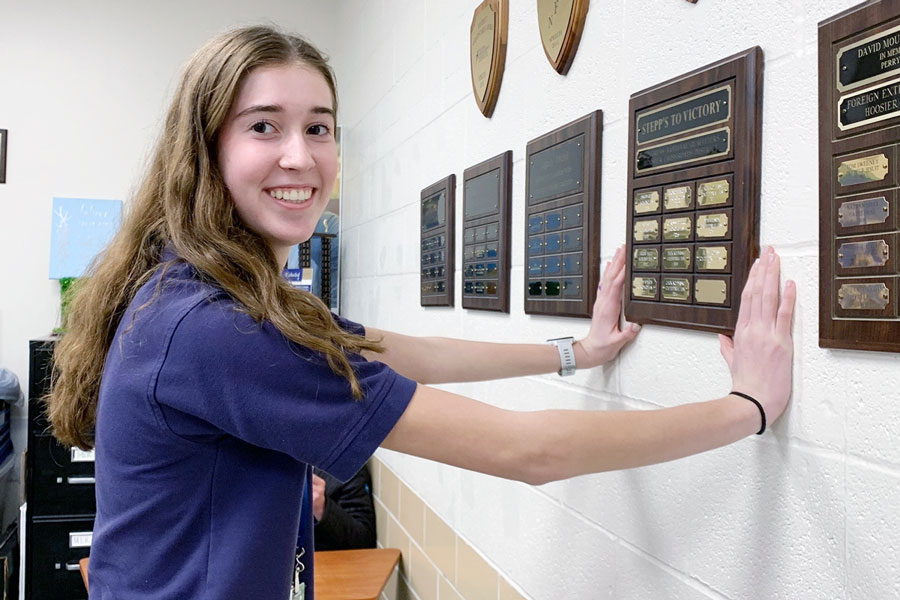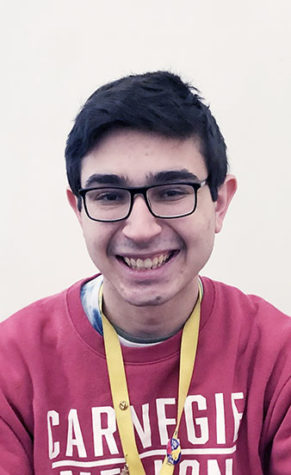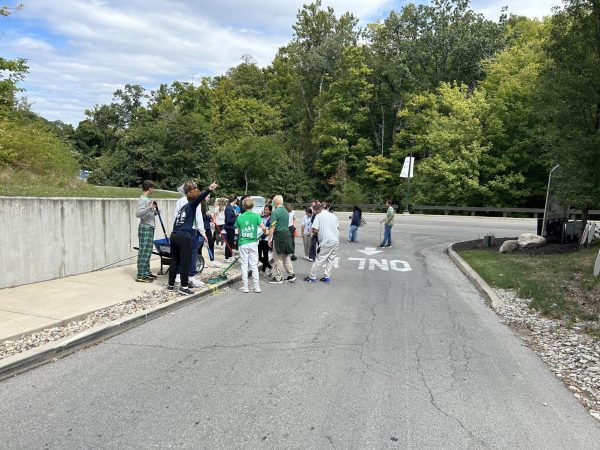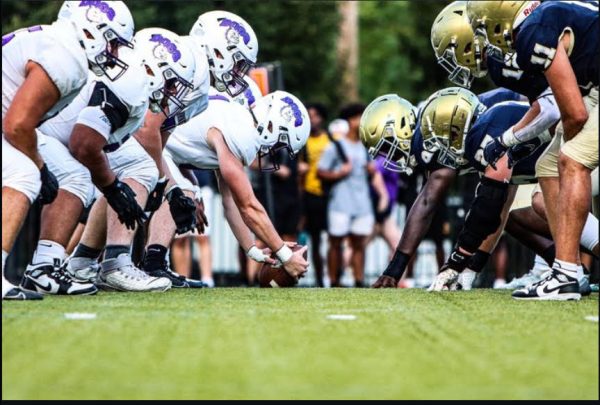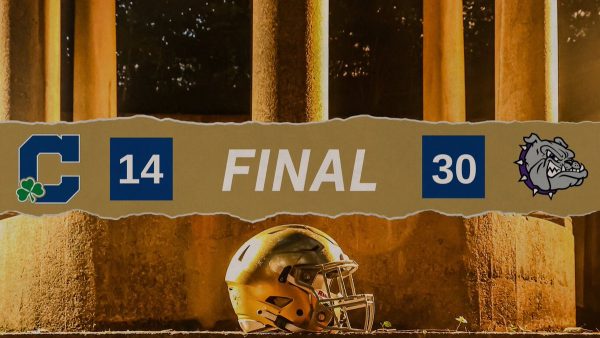Team members qualify for national competition
Speech and debate will participate in events in Louisville
Junior Madeline Taylor hangs the traveling plaque commemorating her victory in the qualifying rounds of Congressional debate.
After a season of spectacular speaking, juniors Madeline Taylor, Sydney Johnston and Isabelle Tompkins, joined by sophomores Daniel Kent, George Madden and Johnny Beauchamp, have qualified for the national speech and debate tournament this June.
For Taylor, the only team member moving on in Congressional debate, representing the vigor of her team and the blazing spirit of the Irish isn’t going to be easy. But she seems ready and willing to embrace the challenge.
In her event, known formally as Congressional debate, Taylor engages in what she dubs “real life politicking” in an academic setting. “It’s pretty straightforward, actually; it’s what you’d think the actual senators and representatives would do,” Taylor said.
Competitors even address each other as senators or congressmen based on the respective chamber they are competing in. Taylor, who takes part in the House, explained how the basic procedure works. “You have a list of speeches you prep beforehand called a docket. And it will be on a variety of topics.” This docket will be released to teams in approximately a month. The resolutions they contain range from such queries as the independence of Kyrgyzstan to more domestic issues like gun control and Covid-19.
In the thick of a meet, the competition proceeds similar to what many sophomores and juniors are familiar with in a debate class. “You have to prepare a three-minute speech in the affirmation or the negation of the bill. You go up, give your speech, and then after you stand for about a minute to two minutes of cross examination in which people try to pick apart what you say,” Taylor said. “Then someone else will go up and you ask them questions to try and mess them up.”
However, according to Head Coach Mrs. Jeanne Malone, there’s a catch to these speeches.
“Everybody prepares both sides to a resolution,” Malone said. That means double the work. It’s a fact of life in debate that a freshman Taylor tragically learned the hard way. “My first time at the first practice I gave a speech on the wrong side and it was honestly really scary,” she said with a retrospective laugh.
All of this writing also means a lot of hard-hitting research, according to Malone. “Ask (librarian/media specialist) Mrs. (Jenny) Herron; she’s our buddy in crime,” she said.
Indeed, it’s been a long journey for Taylor.
Taylor engaged in two of what Malone called “high stakes” tournaments. “If you win, you go on, if you don’t, you go home,” Malone said. A competitor’s season could be a matter of mere weeks or several months depending on performance. The first of these two competitions was limited to the state level, in what Malone equated to a tourney. Taylor’s state season ended a few weeks ago and she finished in ninth place overall.
To get to the national competition, on the other hand, is a whole other animal.
One must first place highly on the district level. For Hoosiers, that means beating out all the debaters in one of three state regions. “You have to get top two in your chamber to qualify,” Taylor said. “I got second so I qualified.”
But her path to victory has only just begun. According to fellow senior speech and debate teammate Hagan McClelland, who’s been to the national championship three times, once for Congress, there will absolutely be obstacles. “It’s going to be tough competition,” he said.
Additionally, Malone noted that most of the competition will be seniors, having a year’s more experience than Taylor in their tool belts. But Hagan’s confident in his teammate’s abilities. “Madeline has put in a lot of work, definitely (gotten) better,” he said.
Speaking of improvement, there’s a hidden blessing in this year’s national championship.
As it has similarly scourged a plethora of other events and activities, Covid-19 has put a real damper on speech and debate. “Last year we had to compete in the nationals from Loretto Hall,” Malone said. The best part of this year’s tournament, she said, is that as of right now “it’s supposed to be in person.”
What’s more, it’s only a short drive, taking place in Louisville, Kentucky. That’s a stone’s throw compared to some past trips Malone’s been on. The team’s gone to Texas and even Utah, where several students and parents were affected by the altitude.
This has been a long time coming for Taylor, who’s been doing this since before high school.
“I went to St. Louis de Montfort for middle school and I remember them sending a call out flyer (during) my sixth grade year,” Taylor said. “I went because I was curious and some of my friends decided to do it, too.”
For Malone, this has been a true life mission. After a successful high school debating career, she received a scholarship to join her college’s team. “I talked my way through college,” she joked. Since then, she’s spent 30 years coaching at the middle school level and over 10 years here on the Hill. Malone felt that she should pay her opportunities forward to others and eventually fell in love with coaching. “Once you teach students to find their own voice, there’s no going back,” she said.
McClelland said that the speech and debate program on the Hill has made him a better speaker and has brought him closer to others, helping him foster real and meaningful connections. “I’ve built a lot of relationships with the people in it,” he said.
Taylor seems to agree wholeheartedly. “I’m really extroverted so it’s a really cool way to meet people,” she said.
Until she receives her docket, Taylor wants to pass on some wise advice from an upperclassman to the curious freshman or sophomore. She hopes other students here take the brave leap of faith she did way back in sixth grade and later during her freshman year. “Come out and try it,” she said. “It’s hard at first, I won’t deny it. But once you get the swing of it, it’s really fun.”


